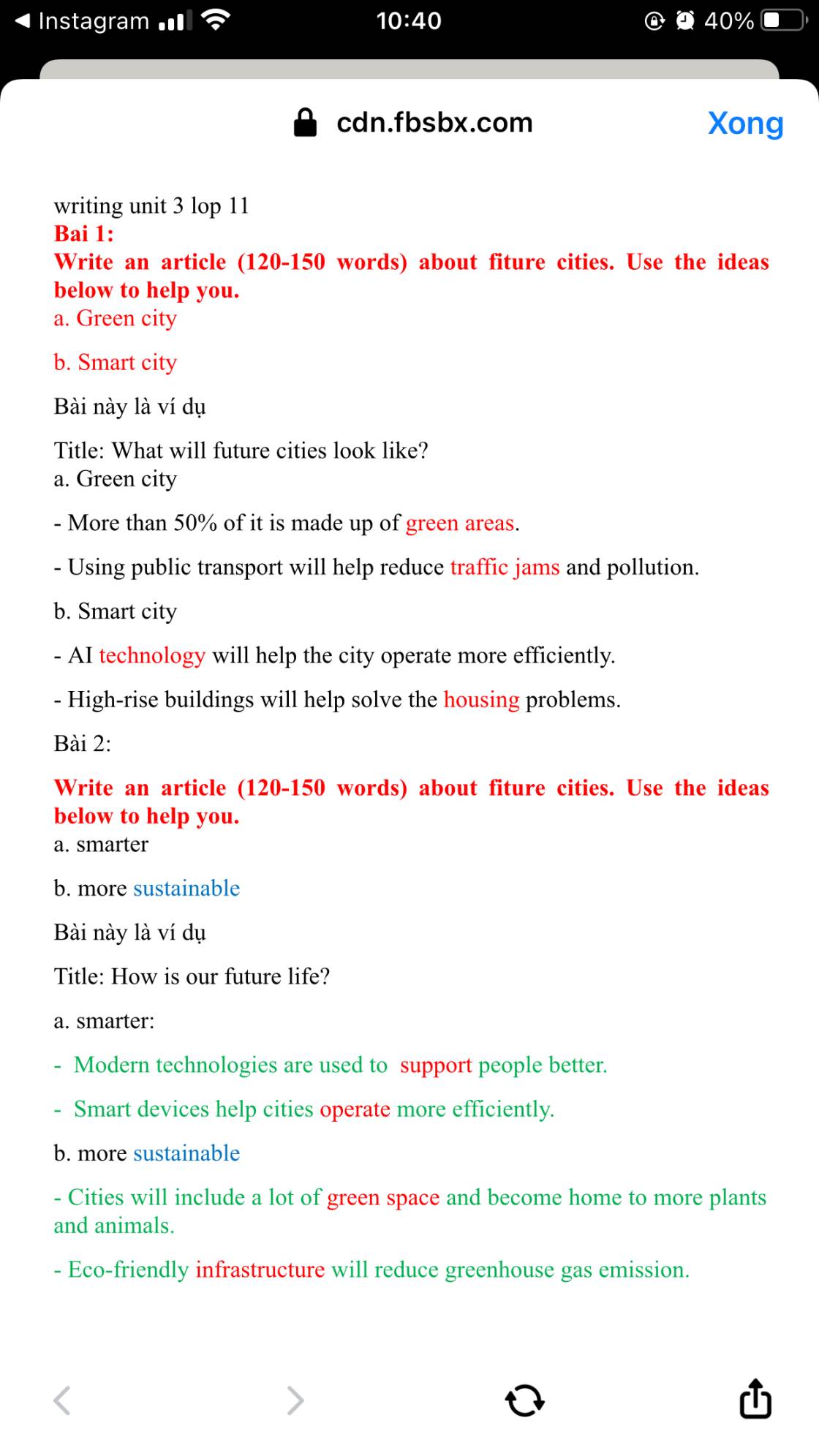Hãy nhập câu hỏi của bạn vào đây, nếu là tài khoản VIP, bạn sẽ được ưu tiên trả lời.

Tham khảo:
THE ADVANTAGES AND DISADVANTAGES OF SMART CITIES
Smart cities are built on new technologies to improve people's lives. The idea of living in one of them sounds very exciting. But is a life controlled by smart technologies good or bad for us?
Let’s start with the advantages. One of the biggest advantages of smart cities is the high level of convenience they offer. With smart technologies in place, people can access information and services quickly and easily. This makes daily life more efficient and saves people a lot of time. Additionally, smart cities are designed to be more sustainable, with green spaces and public transport options to reduce pollution.
What about the disadvantages? One of the main concerns people have about smart cities is the potential loss of privacy. With sensors and cameras constantly monitoring people's movements, there is a risk that sensitive information could be collected and shared. This can lead to a lack of trust and a feeling of being constantly watched. Furthermore, there are concerns about the potential for technology failures and the risks posed by hackers.
In conclusion, there are both advantages and disadvantages of living in a smart city. In my opinion, the benefits of smart technologies outweigh the drawbacks. However, it is important that measures are put in place to protect people's privacy and ensure the safety of their personal information. As long as these concerns are addressed, smart cities have the potential to revolutionize the way we live and work.

Living in a smart city brings many benefits and disadvantages. In this article, I will present some pros and cons of living in a smart city.
The first advantage of living in a smart city is convenience. Information and communications technology is integrated into urban systems, helping to provide public services more effectively. For example, through mobile applications, people can easily search for information about transportation, destinations, and entertainment activities. Furthermore, the smart traffic system helps reduce congestion and save travel time.
Another advantage of smart cities is energy saving and environmental protection. Advanced technologies are applied to manage and use resources effectively. For example, automatic lighting and temperature regulation in buildings help save energy. In addition, the use of smart public transport and self-driving cars helps reduce polluting emissions.
However, living in a smart city also has disadvantages. One of them is the issue of information security. With the widespread use of information technology, the risk of personal information insecurity and privacy violations increases. This requires strong security measures to ensure the safety of people's personal data.
Another drawback of smart cities is their dependence on technology. If technology systems fail or are attacked, public services could be disrupted. This poses challenges for maintaining stability and ensuring security of smart cities.
In short, living in a smart city brings many benefits such as convenience and energy savings. However, it is also necessary to pay attention to information security issues and dependence on technology. To make the most of the advantages and minimize the disadvantages, smart investment and management from city managers is needed.

Living in a smart city brings many benefits and disadvantages. In this article, I will present some pros and cons of living in a smart city.
The first advantage of living in a smart city is convenience. Information and communications technology is integrated into urban systems, helping to provide public services more effectively. For example, through mobile applications, people can easily search for information about transportation, destinations, and entertainment activities. Furthermore, the smart traffic system helps reduce congestion and save travel time.
Another advantage of smart cities is energy saving and environmental protection. Advanced technologies are applied to manage and use resources effectively. For example, automatic lighting and temperature regulation in buildings help save energy. In addition, the use of smart public transport and self-driving cars helps reduce polluting emissions.
However, living in a smart city also has disadvantages. One of them is the issue of information security. With the widespread use of information technology, the risk of personal information insecurity and privacy violations increases. This requires strong security measures to ensure the safety of people's personal data.
Another drawback of smart cities is their dependence on technology. If technology systems fail or are attacked, public services could be disrupted. This poses challenges for maintaining stability and ensuring security of smart cities.
In short, living in a smart city brings many benefits such as convenience and energy savings. However, it is also necessary to pay attention to information security issues and dependence on technology. To make the most of the advantages and minimize the disadvantages, smart investment and management from city managers is needed.

Living in a smart city brings many benefits and disadvantages. In this article, I will present some pros and cons of living in a smart city.
The first advantage of living in a smart city is convenience. Information and communications technology is integrated into urban systems, helping to provide public services more effectively. For example, through mobile applications, people can easily search for information about transportation, destinations, and entertainment activities. Furthermore, the smart traffic system helps reduce congestion and save travel time.
Another advantage of smart cities is energy saving and environmental protection. Advanced technologies are applied to manage and use resources effectively. For example, automatic lighting and temperature regulation in buildings help save energy. In addition, the use of smart public transport and self-driving cars helps reduce polluting emissions.
However, living in a smart city also has disadvantages. One of them is the issue of information security. With the widespread use of information technology, the risk of personal information insecurity and privacy violations increases. This requires strong security measures to ensure the safety of people's personal data.
Another drawback of smart cities is their dependence on technology. If technology systems fail or are attacked, public services could be disrupted. This poses challenges for maintaining stability and ensuring security of smart cities.
In short, living in a smart city brings many benefits such as convenience and energy savings. However, it is also necessary to pay attention to information security issues and dependence on technology. To make the most of the advantages and minimize the disadvantages, smart investment and management from city managers is needed.
\

Living in a smart city offers a myriad of benefits that significantly enhance the quality of life. The integration of advanced technologies in urban infrastructure fosters efficiency and sustainability. Smart cities leverage data analytics and the Internet of Things (IoT) to optimize various aspects of daily living, from traffic management to waste disposal. This results in reduced congestion, lower pollution levels, and improved overall environmental sustainability. Additionally, smart cities often boast enhanced public services, such as efficient public transportation systems and responsive emergency services. Residents can enjoy the convenience of connected technologies, including smart homes and digital services, contributing to a more streamlined and interconnected community. Ultimately, the smart city concept not only enhances urban living but also promises a more sustainable, efficient, and enjoyable lifestyle for its inhabitants.


Living in a sustainable city has numerous advantages, including access to clean and renewable energy sources, efficient public transportation systems, and a strong sense of community. Sustainable cities also tend to have better air and water quality, as well as more green spaces for residents to enjoy. Additionally, sustainable cities often prioritize local and organic food production, leading to healthier and more environmentally friendly food options. However, there are also some disadvantages to living in a sustainable city, such as higher cost of living, potential limitations due to regulations and restrictions, and ongoing challenges related to waste management and pollution.
Living in a smart city brings many benefits and disadvantages. In this article, I will present some pros and cons of living in a smart city.
The first advantage of living in a smart city is convenience. Information and communications technology is integrated into urban systems, helping to provide public services more effectively. For example, through mobile applications, people can easily search for information about transportation, destinations, and entertainment activities. Furthermore, the smart traffic system helps reduce congestion and save travel time.
Another advantage of smart cities is energy saving and environmental protection. Advanced technologies are applied to manage and use resources effectively. For example, automatic lighting and temperature regulation in buildings help save energy. In addition, the use of smart public transport and self-driving cars helps reduce polluting emissions.
However, living in a smart city also has disadvantages. One of them is the issue of information security. With the widespread use of information technology, the risk of personal information insecurity and privacy violations increases. This requires strong security measures to ensure the safety of people's personal data.
Another drawback of smart cities is their dependence on technology. If technology systems fail or are attacked, public services could be disrupted. This poses challenges for maintaining stability and ensuring security of smart cities.
In short, living in a smart city brings many benefits such as convenience and energy savings. However, it is also necessary to pay attention to information security issues and dependence on technology. To make the most of the advantages and minimize the disadvantages, smart investment and management from city managers is needed.